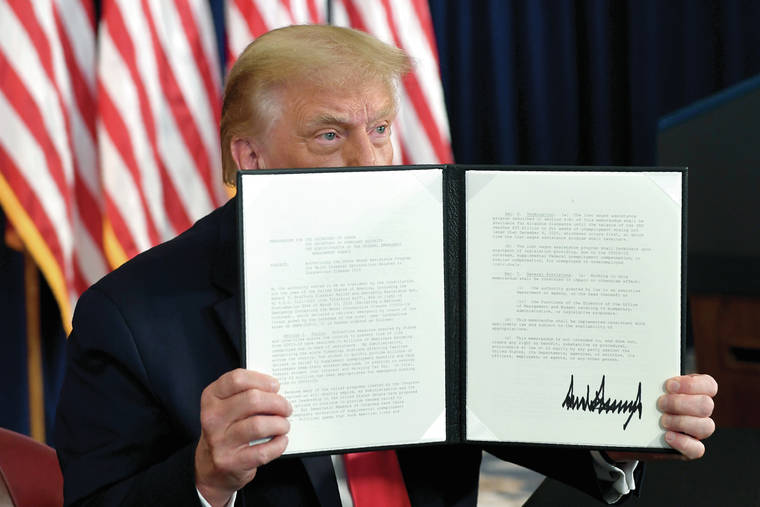BEDMINSTER, N.J. — President Donald Trump on Saturday bypassed the nation’s lawmakers as he claimed the authority to defer payroll taxes and replace an expired unemployment benefit with a lower amount after negotiations with Congress on a new coronavirus rescue package collapsed.
Trump’s orders encroached on Congress’ control of federal spending and seemed likely to be met with legal challenges. The president cast his actions as necessary given that lawmakers have been unable to reach an agreement to plunge more money into the stumbling economy, which has imperiled his November reelection.
Trump moved to continue paying a supplemental federal unemployment benefit for millions of Americans out of work during the outbreak. However, his order called for up to $400 payments each week, one-third less than the $600 people had been receiving. How many people would receive the benefit and how long it might take to arrive were open questions.
The previous unemployment benefit, which expired on Aug. 1, was fully funded by Washington, but Trump is asking states to now cover 25%. He is seeking to set aside $44 billion in previously approved disaster aid to help states, but said it would be up to states to determine how much, if any of it, to fund, so the benefits could be smaller still.
Many states already faced budget shortfalls due to the coronavirus pandemic and would have difficulty assuming the new obligation.
Trump hopes the four executive orders he signed will signal to Americans that he is acting where Congress will not to address economic fallout from the COVID-19 pandemic, which has upended nearly all aspects of American life. It’s unclear what the economic impact of his actions will be, and his orders do not address several areas that have been part of the congressional negotiations, including funding for schools and state and local governments.
House Speaker Nancy Pelosi and Senate Minority Leader Chuck Schumer dismissed Trump’s actions as “meager” in the face of economic and health crises facing Americans. Democrats initially sought a $3.4 trillion package, but said they lowered their ask in talks to $2 trillion. Republicans had proposed a $1 trillion plan.
Trump’s Democratic opponent in the presidential race, Joe Biden, called the orders “a series of half-baked measures” and accused him of putting at risk Social Security, which is funded by the payroll tax.
Trump’s embrace of executive actions to sidestep Congress ran in sharp contrast to his criticism of former President Barack Obama’s use of executive orders on a more limited basis. Though Trump cast it as a necessary step given the deterioration of congressional negotiations, the president himself was not an active participant in those talks.
The orders “will take care of pretty much this entire situation, as we know it,” Trump said, despite the fact that they are far smaller in scope than congressional legislation, and even aides acknowledged they didn’t meet all needs.
In addition to the extension of some unemployment benefits, Trump’s orders call for a deferral of payroll tax and federal student loan payments and efforts to halt evictions. The evictions executive order directs the Treasury and Housing and Urban Development departments to identify funds to provide financial assistance to those struggling to pay their monthly rent.



